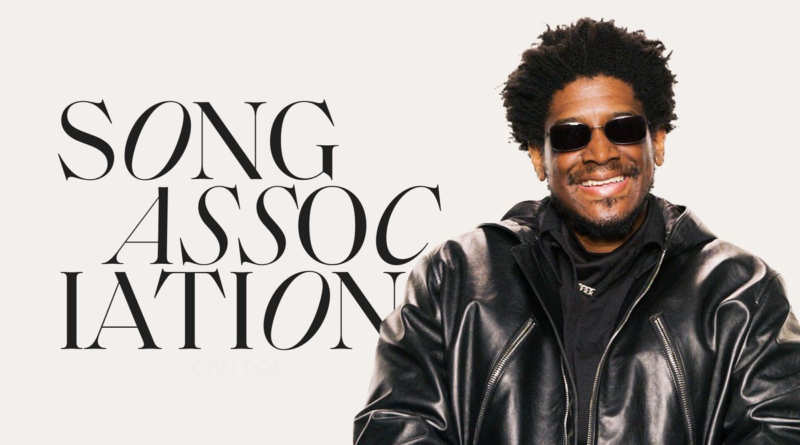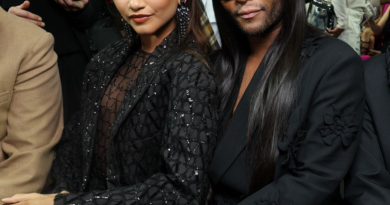In <i>Asteroid City</i>, Wes Anderson’s A-List Cast Isn’t a Power Play. It’s an Act of Precision.
There are moments when watching a Wes Anderson film—particularly his latest, the remarkable Asteroid City—feels like witnessing stop motion in real time. There’s a sense that a giant pair of invisible hands are hovering above the screen’s tableau, arranging pieces to such minute degrees that the movement itself is imperceptible to the eye. Much of this effect can be explained by Anderson’s oft-imitated (never replicated) camera style, and the whimsy with which he jumps from frame to frame. But that doesn’t entirely account for the feeling itself. His film does not wash idly over us; it takes pains to demonstrate its own work. Why? Asteroid City attempts to answer that question, in part, through the maneuvering of its A-list cast.
The story is an intentionally extreme meta-commentary on storytelling, celebrity, and the vast unknowability of existence. The tight 104 minutes hop between sets as a television host (Bryan Cranston) takes us behind the scenes of the making of a play called Asteroid City, the world of which we are fully immersed in as the screen saturates with delicious Andersonian color. The play itself is set in a fictional desert town in 1955, when and where the characters converge for a Junior Stargazers convention. Among them are grieving war photographer Augie Steenbeck (Jason Schwartzman) and his brood, whom he’s yet to inform of their mother’s recent death. Amidst a backdrop of atom-bomb testing and general post-World War II malaise, the Stargazers show off their inventions as their parents, fellow scientists, and convention-goers soon experience a life-changing discovery.
As critic Bilge Ebiri noted in his review for Vulture, Asteroid City “is a play within a play within a TV production within a movie.” And within that, there’s the meta-commentary of the splashy cast itself. This cast includes (but, trust me, is not limited to):
More From ELLE

- Jason Schwartzman as Augie Steenbeck (and the actor playing Augie)
- Scarlett Johansson as aloof movie star Midge Campbell (and the actress playing Midge)
- Tom Hanks as the begrudging Stanley Zak, Augie’s father-in-law
- Jeffrey Wright as General Grif Gibson
- Tilda Swinton as scientist Dr. Hickenlooper
- Bryan Cranston as The Host
- Edward Norton as famous Asteroid City playwright Conrad Earp
- Adrien Brody as Asteroid City director Schubert Green
- Liev Schreiber as J.J. Kellogg, father of a Junior Stargazer
- Hope Davis as Sandy Borden, mother of a Junior Stargazer
- Stephen Park as Roger Cho, father of a Junior Stargazer
- Rupert Friend as cowboy Montana
- Maya Hawke as schoolteacher June Douglas
- Steve Carell as the town’s motel manager
- Matt Dillon as local mechanic Hank
- Hong Chau as Polly Green, Schubert’s estranged wife
- Willem Dafoe as Asteroid City acting teacher Saltzburg Keitel
- Margot Robbie as the actress playing Augie’s would-be wife
- Tony Revolori as the Aide-de-Camp
- Jake Ryan as Woodrow Steinbeck, Augie’s son (and the understudy playing Woodrow)
- Grace Edwards as Dinah Campbell, Midge’s daughter
- Ella Faris, Gracie Faris, and Willan Faris as Augie’s identical triplet daughters
- Jeff Goldblum as The Alien
It’d be tempting to view such an eye-popping ensemble—as has been the case with many of Anderson’s films—as a power move on the director’s behalf. As one of the most acclaimed directors in Hollywood, look at the names he can pull, again and again! And certainly, there are plenty of actors frothing at the mouth to feature in his pictures, often repeatedly. As Davis told me in an interview: “It’s my first Wes Anderson film, and it’s a call I’ve been waiting for for a long time.”
Still, however paradoxical it might sound, Anderson’s long list of heavy-hitters is, in fact, grounded in a show of restraint. Asteroid City does not hitch itself to the momentum of their names but forces them to surrender to its pace. That’s the point of the film itself: All the pieces align to create something they cannot yet understand, and cannot manifest alone. Anderson knows exactly when to pluck each string in his possession.
As Hawke, who plays schoolteacher June, put it to me, “Wes has very specific casting.” She continued, “I found myself in a role where the rhythm of the language, which is almost like sheet music, was really clear to me for that character.” Anderson knows what he wants his characters to say; how he wants them to say it; and—perhaps most importantly—who is best equipped to say it. Never care that Robbie is arguably the biggest actress of 2023: Anderson plants her in one single minutes-long scene, and it might be the most affecting exchange of the entirety of Asteroid City. Then, of course, there’s Johansson, simultaneously at her most resplendent and yet compact, and Schwartzman, elegant in his befuddlement over what exactly this play, this Stargazers competition, this war, this grief, this movie means. “Just keep telling the story,” Brody’s Schubert Green instructs him.
“A weird lesson that I got, but I didn’t get until I saw the movie, was like—watching it, it’s like a magician is like, ‘Watch the card closely. I’m going to make it [disappear],’” Schwartzman told me of seeing Asteroid City in theaters. “And then it’s behind your ear. And I think that working with [Johansson] had an element of that, where we’re doing these scenes together—I’m watching everything that’s happening—and yet, when I watch the movie, I’m like, ‘Whoa.’ There’s little things that are like sleight-of-hand magic.”
Many of the same sought-after actors—including Schwartzman himself—appear multiple times throughout Anderson’s catalog, from Moonrise Kingdom to The Darjeeling Limited, but they’re arranged with the precision of pins, not darts tossed in competition. Anderson gets critiqued for a “style over substance” approach, but I actually think the opposite is often true. He cares so deeply about the substance that he ensures the style (in this case, the actors themselves) is in cohesion.
Without spoiling too much, Asteroid City ultimately reveals that neither Schwartzman nor his character actually need to grasp the meaning behind the mystery—not any more than any of us watching need to physically see the hands working above the screen. We know they’re there. We can feel them. Sometimes, that’s enough.
Culture Writer
Lauren Puckett-Pope is a staff culture writer at ELLE, where she primarily covers film, television and books. She was previously an associate editor at ELLE.





